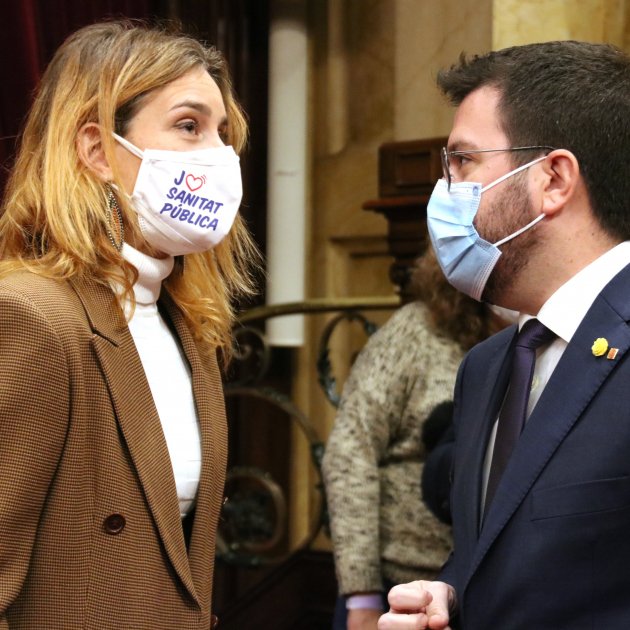The Catalan president, Pere Aragonès, has met with the president of the En Comú Podem (Comuns) parliamentary group, Jéssica Albiach, this Friday at the Palau de la Generalitat in Barcelona. The encounter, reported by El Periódico and confirmed by El Nacional.cat, was the first meeting held by the president with the representative of another Catalan parliamentary party since last week's decision by Together for Catalonia (Junts) to walk away from the pro-independence coalition government left the Catalan Republican Left (ERC) on its own and forced Aragonès to reshuffle his executive.
During the meeting, Albiach took the opportunity to convey to the president her doubts about the stability of the new executive. Comuns sources have commented that they do not know what plan Aragonès has to survive the rest of the legislature or what alliances he seeks to establish, bearing in mind that the 33 ERC members of parliament are far from the 68 votes required for an absolute majority in the house. In addition, they have warned that they will not give a blank cheque to the government's proposals, but that each law, each decree and each motion will have to be negotiated separately. "Don't take anything for granted," said the sources. However, they regretted that the meeting did not yield many answers, as Aragonès did not resolve the alternative left party's doubts about the continuity of the government. "It was a courtesy meeting, from which we left not very differently to how we entered," they confirmed.
Round of meetings following calls
Aragonès already explained in an interview he gave yesterday on Catalan public television that he had maintained telephone contacts with the leaderships of Junts, the Comuns, the radical left pro-independence CUP and the Catalan Socialist Party (PSC), after the restructuring of the executive caused by the departure of the party led by Laura Borràs and Jordi Turull. This, however, was the first meeting he held and the intention, according to government sources, is to do the same with the other parties he has contacted. At the moment, however, the agendas are not closed.
"They will be private conversations to talk about the current political and economic situation, along the lines of other previous meetings, and not to address a single specific issue", specify sources from the Palau de la Generalitat, who add that the meeting between Aragonès and the leader of the Comuns lasted for less than an hour.
Albiach, who has in recent days backed the need to build a progressive majority of left-wing forces in the Catalan Parliament, had stated bluntly the government was born "dead" after learning of Aragonés's decision to govern alone. However, in public statements she reiterated the need for negotiation to approve the 2023 Catalan budget and avoid having to simply extend the current year's accounts. In this regard, she warned that she would not give a blank cheque to the executive to approve the annual finances.
For his part, the president has repeated since the formation of the new government that his priority is to get the budget passed with the support of the groups that have so far supported the government, that is, Junts, the Comuns and the CUP. Despite not ruling out the possibility of reaching agreements with the PSC, he has underlined his desire to govern for the "consensuses of 80%" in Catalonia - that is, those who support a referendum to decide Catalonia's political future, as well as an end to the repression of the independence movement.
PSC: there is no repression in Catalonia
In fact, this Friday, the spokesperson for the Catalan Socialists, Alicia Romero, asserted that her party does not see repression in Catalonia. That was how she responded after president Pere Aragonès had argued yesterday that, beyond a possible budget negotiation, he wanted to reach "agreements on other matters such as in the anti-repressive area" with the PSC. The party's leader, Salvador Illa, has already warned Aragonès that he will not accept "lessons" in this field, and today's stand by Romero hammered the same point further. "We do not see that there is repression in Catalonia, it is a country in which rights and freedoms are respected", she said, adding that at present "the most important things are the problems of families and companies. When we have met with unions and employers, no one has told us about the repression", she said.
